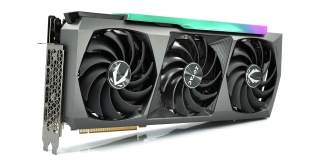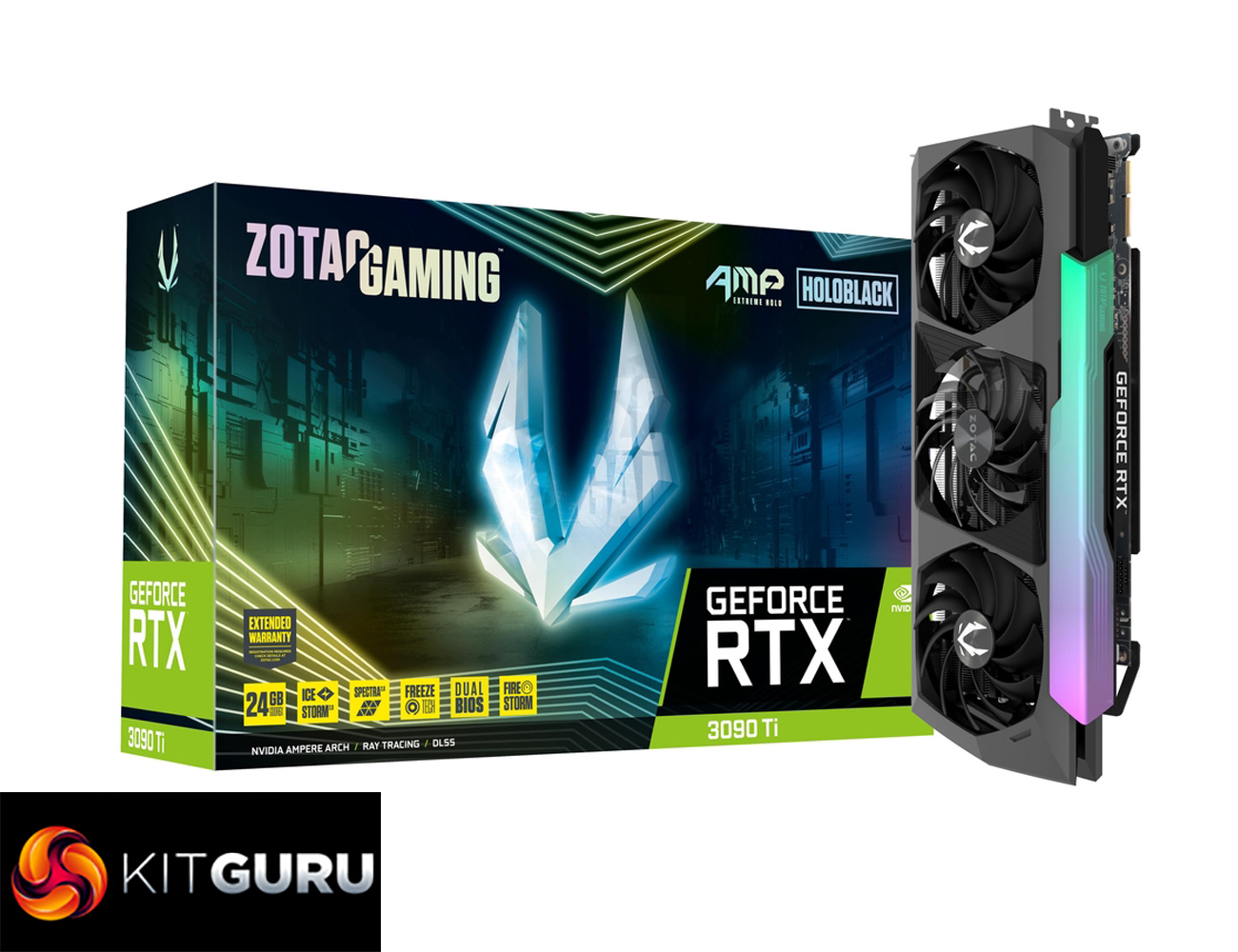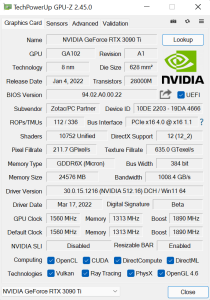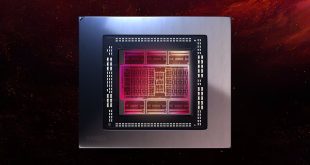
In our fourth RTX 3090 Ti review, we turn our attention to Zotac and the Amp Extreme Holo. As Zotac's flagship graphics card, the Amp Extreme Holo comes factory overclocked, with dual-BIOS support and plenty of RGB lighting. Priced just under the £1900 mark, is this a card to consider if you want the fastest gaming GPU on the market right now?
If the Zotac RTX 3090 Ti Amp Extreme Holo looks familiar, that's probably because we reviewed the original RTX 3090 version last June. The 3090 Ti version picks up exactly where the non-Ti model left off however, with a smart-looking HoloBlack cooler design, metal backplate and three beefy 100mm fans.
Today we compare it against the likes of MSI's Suprim X, Palit's GameRock OC and the Aorus Xtreme Waterforce, looking at gaming performance, thermals, acoustics and more.
| RTX 3090 Ti | RTX 3090 | RTX 3080 Ti | RTX 3080 | RTX 3070 | |
| SMs | 84 | 82 | 80 | 68 | 46 |
| CUDA Cores | 10752 | 10496 | 10240 | 8704 | 5888 |
| Tensor Cores | 336 | 328 | 320 | 272 | 184 |
| RT Cores | 84 | 82 | 80 | 68 | 46 |
| Texture Units | 336 | 328 | 320 | 272 | 184 |
| ROPs | 112 | 112 | 112 | 96 | 96 |
| GPU Boost Clock | 1860 MHz | 1695 MHz | 1665 MHz | 1710 MHz | 1725 MHz |
| Memory Data Rate | 21 Gbps | 19.5 Gbps | 19 Gbps | 19 Gbps | 14 Gbps |
| Total Video Memory | 24GB GDDR6X | 24GB GDDR6X | 12GB GDDR6X | 10GB GDDR6X | 8GB GDDR6 |
| Memory Interface | 384-bit | 384-bit | 384-bit | 320-bit | 256-bit |
| Memory Bandwidth | 1008 GB/Sec | 936 GB/Sec | 912 GB/Sec | 760 GB/Sec | 448 GB/Sec |
| TGP | 450W | 350W | 350W | 320W | 220W |
Let’s first recap the exact makeup of this GPU however. The RTX 3090 Ti uses GA102 silicon, but it’s the first time we have seen a fully populated die. That means the RTX 3090 Ti incorporates 84 Streaming Multiprocessors (SMs), and thanks to Ampere’s SM structure with its two FP32 datapaths, each SM houses 128 CUDA cores, giving a total of 10752. This is an increase of 256 cores compared to the RTX 3090, an extra 2.4%.
Ampere also places one RT core, and four Tensor cores, in each SM, giving a total of 84 RT cores and 336 Tensor cores. This is accompanied by 336 texture units and 112 ROPs which are housed directly within each graphics processing cluster (GPC), with 16 ROPs per GPC, and 7 GPCs in total for RTX 3090 Ti.
Clock speed is another area where Nvidia has made improvements compared to the RTX 3090. The RTX 3090 Ti has a reference clock of 1860 MHz, a boost of 165 MHz against the RTX 3090, though of course the Amp Extreme Holo comes factory overclocked. We test real-world clock speed behaviour later in this review.
For the memory, Nvidia is using the same 384-bit bus as found with the RTX 3090. The memory allocation itself remains with 24GB of GDDR6X, but the kicker is these modules themselves have been upgraded to new 21Gbps chips. This brings total memory bandwidth up to over 1TB/s, hitting 1008GB/s to be precise.
Lastly, for total graphics power, Nvidia rates the RTX 3090 Ti for 450W, an increase of 100W, or 28.6% compared to the vanilla RTX 3090. The Amp Extreme Holo does not push this further.
 KitGuru KitGuru.net – Tech News | Hardware News | Hardware Reviews | IOS | Mobile | Gaming | Graphics Cards
KitGuru KitGuru.net – Tech News | Hardware News | Hardware Reviews | IOS | Mobile | Gaming | Graphics Cards




